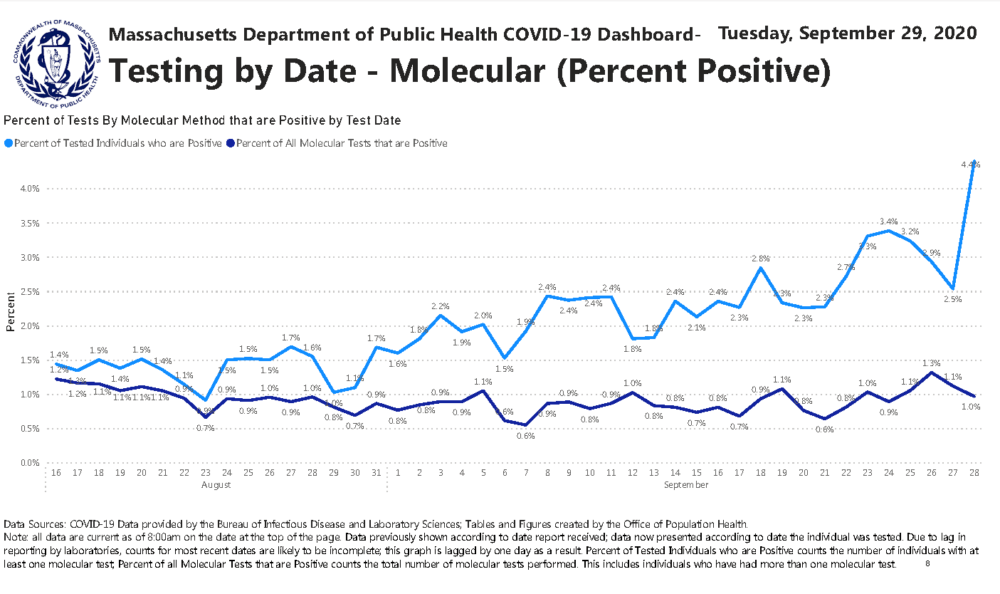Advertisement
Coronavirus Coverage
With The Coronavirus Creeping Back In Mass., Health Experts And Community Groups Call For Action
In the last few weeks, the positive test rate for the coronavirus and statewide hospital admissions for COVID-19 have crawled slightly but noticeably upward. At the end of August, the average number of COVID-19 patients in the hospital was roughly 300. As of Tuesday, it was over 420.
Why exactly the state's coronavirus numbers are rising is unclear, said Caroline Buckee, an epidemiologist at Harvard University. But it may be that slight increases in coronavirus transmission that began after the state started reopening over the summer have finally built momentum, Buckee hypothesized.
“Honestly, I don’t know,” she said. “It’s hard to pinpoint what’s driving transmission in certain places. The worry is that gradual trend in increasing cases continues and starts to take off in a situation where we have significantly higher rates of morbidity and mortality.”
Buckee has joined a group of local community and health leaders around the state, led by the Massachusetts Coalition for Health Equity, in criticizing Gov. Charlie Baker for moving forward with the state's reopening plan.

Baker unveiled details of the next phase for reopening on Tuesday. He said “lower risk” communities, defined as towns that have fewer than five daily COVID-19 cases, can further relax some restrictions on private gatherings, recreational activities and businesses. For instance, indoor recreational venues like arcades, roller rinks and concert venues will be allowed to reopen on Oct. 5, with limited capacity.
That is not sitting well with local leaders like state Rep. Mike Connolly, a Democrat who represents Cambridge and Somerville. In a virtual press conference Tuesday, Connolly called the recent COVID-19 case numbers and positive test rates “alarming,” and rebuked the governor for moving ahead with further reopening.
“Despite these warnings that COVID is trending upward in Massachusetts, we’ve seen really concerning actions by the governor,” he said. “Indoor dining was expanded, and certain restrictions on indoor dining were lifted just this past week.”
Advertisement
Epidemiologists are warily eyeing the approaching winter like storm clouds on a horizon, according to Buckee. Although there’s still more data that must be examined to understand the pandemic’s direction in Massachusetts, Buckee said the rising rate of positive coronavirus tests makes the cold months loom more threateningly.
“One of the reasons why I’m worried about winter is because other seasonal coronavirus and human behaviors that drive transmissions are likely going to exacerbate risks for us,” she said. “Given that we are going to survive this winter, what should be happening is we should keep community transmission as low as possible.”
To Buckee, that means avoiding activities that are known to have higher risks of coronavirus transmission like indoor dining and large indoor gatherings. Being proactive about that now might help schools and other businesses remain open through next spring, Buckee said.
“With the reopening, we need to be very cautious. I personally will not be indoor dining this winter at all,” she said. “While I understand we must resume economic activity, we need to be very careful about particular settings as we know that can lead to clusters, and those lead to larger outbreaks.”
Buckee and Connolly, along with 30 organizations and hundreds of health experts, physicians and community leaders, signed an open letter calling for Baker to do more to curb the spread of the pandemic and asking him to reinstate certain COVID-19 restrictions. Their demands include reducing the number of indoor dining guests allowed at restaurants and closing casinos and other indoor recreational areas.
The letter focuses on what advocates say is a need for more targeted COVID-19 interventions to help low-income communities, workers and communities of color that continue to struggle disproportionately with the coronavirus.
“Gov. Baker has neglected to be inclusive in his policies in practice. Immigrants of color are the ones who are dying the most,” said Natalícia Tracy, executive director of the Brazilian Worker Center and part of the coalition that is criticizing the state's reopening process. “[Gov. Baker], do your job, please. Make sure testing for people who need to be tested is available. Make sure that people can get paid when they need to be home and sick. We haven’t seen those types of support in our community yet, and we need that.”
The Baker administration defended its efforts to fight the spread of the virus on Tuesday, citing policies designed to help communities of color. Secretary of Health and Human Services Marylou Sudders announced a new grant program and highlighted the state’s COVID-19 interventions in hard hit communities like Chelsea and Lynn.
“Chelsea has come down from 32 incidents [of coronavirus] per 100,000 residents to 22. Lynn has come down from 23 per 100,000 to 11 and continues building on this progress,” Sudders said.
Sudders added that the state is using detailed data to quickly target clusters of new COVID-19 cases. In Salem, after a quick spike in cases, Sudders said the state provided free mobile testing for several days and took other actions to help quell the local increase.
“Very successful — Salem went down from 11 down to 3 and a half. So, what we’re trying to do is very much tailor [our response] now,” Sudders said.
Overall, Harvard’s Buckee said Massachusetts has and continues to do relatively well in managing the pandemic and using targeted, local interventions is the right thing to do, she said. But, she added, that still doesn’t mean it’s wise to allow communities with fewer COVID-19 cases to ease restrictions on activities like concerts or expand indoor dining at a time when other communities continue to face a higher risk from the virus.
“We are all connected to those communities,” she said. “We are not isolated. And the longer we fail to control community transmission, the longer we are unable to engage in activities we like and go back to our lives.”

